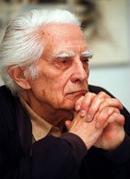Cu

Cunhal, Álvaro (1913-2005)
Born in 1913 in Coimbra. Studied Law at Coimbra and graduated from Lisbon University, joining the Communist Party in 1931.
He was first elected Secretary General of the party 1935.
In 1937 and 1940 he was imprisoned and was tortured during both these periods. In 1948 he was imprisoned again and was sentenced to 11 years prison, of which 8 years were to be solitary confinement. He escaped in 1960 and spent his exile in Paris, at least unti 1969, and then the USSR until 1974.
In Russia in 1961 he was again appointed the Secretary General of the Portuguese Communist Party as an absentee. He retained this post until his appointment as President of the Party in 1992.
During the unstable period after the 25 April revolution he held ministerial offices in the first four consecutive Provisional Governments. In 1996 he retired from the office of President but remained on the Central Committee of the Party.
Cunhal died on 13th June 2005.
Cuno, Theodor Friedrich (1847-1934)
Pseudonym Frederico Capestro. Prominent figure in the German and International working class movement. Engineer. Expelled from the country at the beginning of the 'seventies, took part in the organisation of a section of the International in Milan, Italy, opposing the anarchists, and stood for the line of the General Council. At the Hague Congress (1872) he was chairman of the commission which decided on the expulsion of Bakunin from the First International. Cuno later emigrated to America, where he collaborated in the New York People's Paper.
Cunow, Heinrich (1862 - 1936)
German social democrat and university professor who was a ethnographer, and theoretician of the group led by Scheidemann. Before WWI considered himself an orthodox Marxist and consistently fought against revisionism. During the war he became a social-chauvinist.

Curiel, Henri (1914-1978)
Born in Alexandria, Egypt to a well-to-do Sephardic family, at an early age Curiel became active in the nascent Communist and anti-colonialist movements in his homeland. In the post-war years he was key in organizing anti-British demonstrations, and in 1950 he was deported to Italy (of which he was a citizen, under the concessionary system in place in Egypt), eventually moving illegally to France.
There he was the heart and soul of the group that was to become know as the “porteurs de valises,” the valise carriers, French men and women who actively and materially aided the Algerians in their fight for independence. In their valises they carried money to Switzerland, and on the return trip arms for the FLN.
Curiel was jailed for his activities, and upon his release in 1962 he expanded his field. He led the group Solidarité, which provided assistance to Third World liberation groups in the areas of cadre formation, sabotage, fabrication of false papers, mapmaking, and coding.
All his life he fought for Israeli-Palestinian friendship, and that issue, as well as the liberation struggle in South Africa, was the main focus of his final years.
He was murdered in his Paris home by a group calling itself Delta. The killers were never found, and it was speculated that they worked for either the Israeli Mossad or the South African BOSS.
Gilles Perrault, in his biography Un Homme a Part (translated as A Man Apart) said of him that this “stateless Jew was one of the great citizens of the Third World.”
See article by Gilles Perrault in Le Monde Diplomatique
Curzon, George Nathaniel (Lord Curzon) (1859-1925)
Aristocrat educated at Eton and Oxford. Viceroy of India 1898-1905: strengthened the apparatus of colonial rule, partitioning Bengal and fortifying the North-West Frontier against a threat from Tsarist Russian imperialism. Became an earl in 1911; joined Lloyd George's War Cabinet in 1916; Foreign Secretary first under Lloyd George in 1919 and then under Bonar Law and Baldwin, 1922-24. A leader of the right-wing of the Conservative Party in this period, he combined traditional hostility to Tsarist Russia with his class loyalty culminating in constant aggression towards the R.S.F.S.R. through diplomatic manoeuvres.